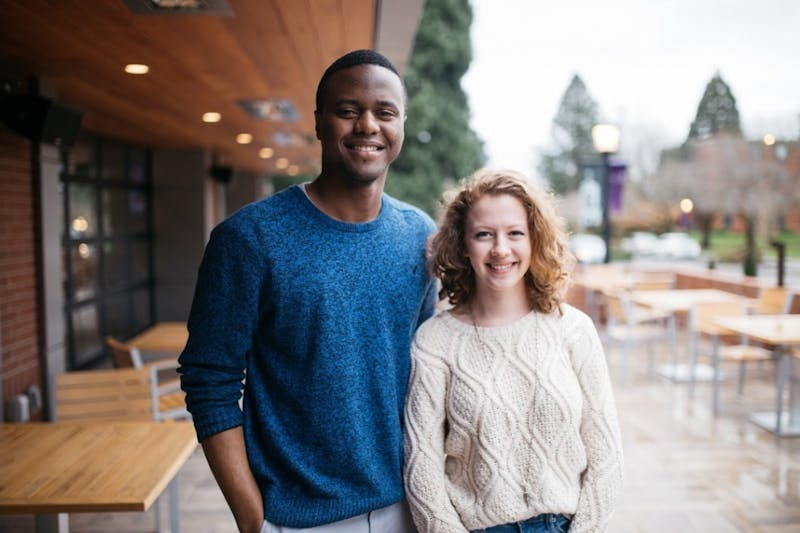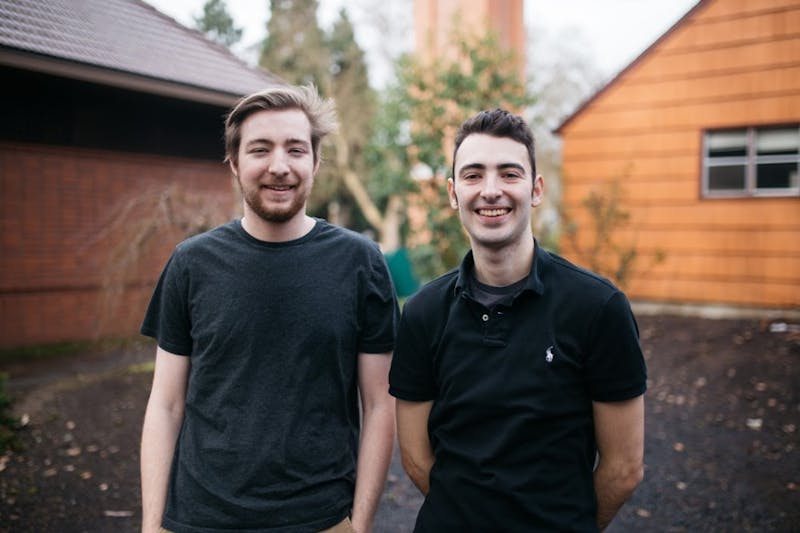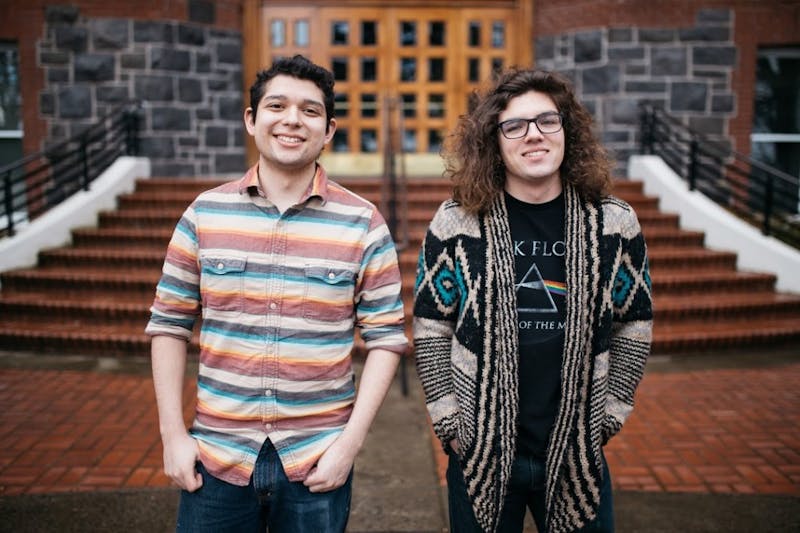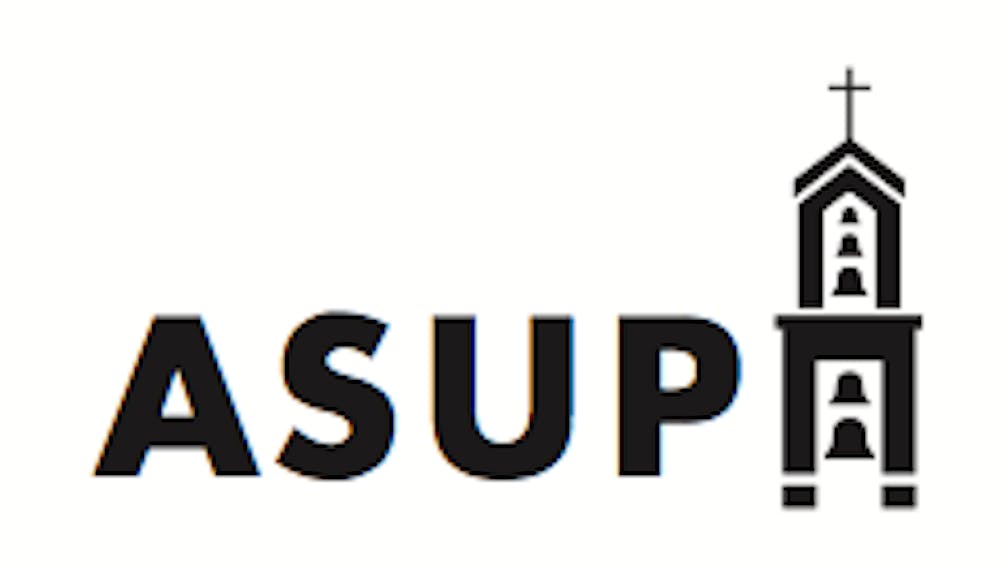The presidential elections are long over, but now it's time for ASUP campaigning and elections. On Tuesday, March 7, the candidates addressed students on the quiet side of The Commons at 7 p.m. and will be at Espresso UP on March 8 to take additional questions from students.
The Beacon spoke with each pair of candidates about their campaigns:
Tsikata Apenyo (P) and Abby Sherman (VP): Junior Tsikata Apenyo, ASUP’s current vice president, is running for President next year alongside junior Abby Sherman, the president of Students Against Sexual Assault.

What issues are you most passionate about working on at UP?
Sherman: The one issue in particular that was the first thing that came to mind is the issue of sexual assault. I started a student organization here on campus called Students Against Sexual Assault; we started in the fall and we just became official as an organization this spring. That has been my passion and focus in terms of advocacy on this campus. We both believe that this is the biggest issue that college students are facing today not just at this campus but across the country - it’s an epidemic.
I’ve spent a lot of time looking at Title IX and different issues surrounding sexual assault and where the problem lies, I think there is a lot that we, as a university, can do to set ourselves apart. Bringing an end to sexual assault is such a broad term, but thinking about ways to create a campus culture that says “we don’t accept sexual violence on this campus.”
Also making sure everyone feels like they have a place here regardless of race, gender, ethnicity, gender identity, orientation, creed, everything. Inclusivity of all these issues but, first and foremost, sexual assault.
Apenyo: She’s amazing. To go off of that, one of the reasons I chose UP is because it’s a really small, tight-knit community. It really breaks my heart when other students consider leaving because they don’t feel safe here.
The other part of our platform is safety, it is the relationship between Public Safety and students. (We think) that’s a really fractured relationship, students and Public Safety don’t always see eye to eye.
What plans do you have to solve these issues?
Sherman: A lot of difficult conversations, right now one thing we have talked about is calling for transparency. With the Ad Hoc Committee on Title IX, we want to see those recommendations be followed through. One thing we see a lot in politics in general is a lot of talk. I’m not a politician, I never have been, but I am a student that cares about these issues and wants to see change happen.
With the committee, we have a chance to see real policy change, whether that’s any of those recommendations that will be public very soon. We are very excited to see what the committee comes up with, and work closely with them and make sure that those recommendations are seen to their fullest and carried out. There is a historic gap between administration, student leadership and students. We want to bridge that gap and make sure there is 100 percent transparency; I feel the student body deserves it, we deserve it.
Things like a full time Title IX Coordinator don’t take a day, we understand that, but we want to make sure that we’re continuing on the push to make that change.
If we continue these conversations and amplify them to a degree where student leadership is talking about it, administration is talking about it, most students are talking about it, it makes them more important and brings them into the light. If people start to really talk about it, then the campus attitudes will change; that is where change starts, is when people start to look at things in a different light.
Apenyo: Abby, being one of the leaders of SASA, she’s worked closely with (Elise) Moentmann, who is heading the Title IX committee. They’ve been in constant communication. One of the biggest things that we want to make sure happens is that when the committee brings recommendations forward — it will probably be over the summer — we don’t want things to slide under the rug or not really be impactful for the students. We want to make sure those recommendations are implemented and that means holding administration responsible.
Sherman: We want to be people you can voice your frustrations to.
Why did you decide to run for President/VP?
Apenyo: In the past year, I’ve seen that in this position in ASUP, you have a chance to make impactful change at this University. Food Carts and Parking (his platform with President Brandon Rivera this year) — that’s not really impactful. That’s stuff that’s going to happen eventually and it doesn’t really affect people’s lives every single day. (Sexual assault) is something that’s really important and I saw that.
Being in the position for over a year, I realized that UP’s administration actually listens to you, so if you want to make your platform food carts or parking or re-creating the Anchor, that is what they are going to think is important when that’s not really the issue that affects students every single day… We’re going to be in Waldschmidt every single day saying, “Hey, what are you doing? You said you were going to do this, why is this not happening?” and really just holding people accountable.
Sherman: I’ve always thought about doing student government, I did it a lot in highschool. SASA was like my baby, and I started to see that it was progressing and I was like, “How can we create more change?” I felt that this was the necessary next step, policy change for me is the ultimate form of actual change.
I wouldn’t being doing it if it wasn’t something I cared deeply about. We would not run on any other platform.
Apenyo: I was not planning on coming back to ASUP. We have done a lot of great things this year, I won’t put that aside, but I didn’t think what we were doing was really impactful. Abby and I were talking and we mutually came up with this together and that’s something I can really get my heart behind. It’s something I know is going to matter when my sister comes here in a couple years that is going to impact her life.
What we are working towards right now is something that we can come back here 25 years from now be like, “That’s something we did and that’s really cool.”
Tsikata, what are three accomplishments you are most proud of this year as VP?
Apenyo: This has been one of the more successful years ASUP wise — we got a lot done, we started to revitalize ASUP. Working with other organizations, like with athletics we did the tailgate, partnering with Residence Life for hall olympics.
What is a fun fact about yourselves that you think the student body should know?
Apenyo: I was born in Ghana and I spent half my life there.
Sherman: Oh gosh, now I have nothing. You’re so much more interesting than I am. I love the outdoors. If I could spend every minute in a tent outside, I would.
---

Brandon Rivera (P) and John Akers (VP): Current President Brandon Rivera is running for president, and Speaker of the Senate John Akers is running for vice president.
What issues are you most passionate about working on at UP?
Akers: Our platform is education inside and outside the classroom, physical and non-physical safety, and sustainability for a cleaner and greener future. Those are the three big topics we want to focus on, they are all more difficult to measure, but are things we have experience working with this year.
Although we’ve made small steps, we’d like to take larger steps in that direction, things like bringing back classes that people want, a big one is World Religions. The dorm composting program was something we funded and supported last semester and it’s been going really great this semester; we want to continue to support that.
Rivera: The education side, I want to touch a little more on that. We really want to look at the academic curriculum and incorporate more diverse classes. We feel like diversity is something that’s missing in the academic curriculum, and we really want to look at freshman orientation and freshman workshops and how we can make those better for incoming students.
We really want to also look at how professors are being treated here at the University. A heated topic right now is salaries for our teachers and we really want to address that, looking at how we can be apart of those conversations, because we want good teachers here at the University of Portland and it’s tough when we can’t pay them the average salary nationwide.
We also want to keep continuing our support towards Green Dot and education on sexual assault, bringing more awareness to that and making sure our students feel safe and included here at the University.
What plans do you have to solve them?
Rivera: Starting with sustainability, the biggest attribute John and I have is that we are really good communicators, we really like to get everyone involved. At the start of the year, we want to get all the sustainability coordinators together and on the same page on what we want to get accomplished this year. The compost program, we really want to see that happen, that’s been such a successful thing so far. It’s collected hundreds and hundreds of pounds of waste.
We want to be making sure we can save more energy, save more water here the the University. We want to make sure we can improve our infrastructure here at UP. In terms of safety, we want to continue to have conversations with Jim Ravelli (Vice President for University Operations). I’ve had the privilege of having a really good relationship with Jim, so if we are elected again, that transition is super easy.
Akers: The crosswalk problem should’ve never happened and the ice on the sidewalks is a huge safety hazard. The University did not have the infrastructure to make sidewalks safe, so school was cancelled sometimes and I heard reports from the academic senate meeting of professors saying they didn’t feel safe coming to campus.
Another issue is that the Business and Engineering schools have their own internship programs. College of Arts and Sciences has some internships, but they are not at that level. Because of the diversity of the majors within CAS, it’s hard to narrow it down to one program, but we want to work with the career center to help set students up for success after they graduate.
Why did you decide to run for President and Vice President?
Rivera: It was a tough decision. I started thinking about the year and how it went, and I started to think I really do like this job. I’ve put so much effort and hard work into this job that I just want to see if be successful next year, and I feel like I can continue to bring that hard work and success. When I met with administrators in February they said a president has never come back for a second term here at the University of Portland, so that was something that was really interesting to me and struck me. I really want to go back and work hard for the students.
I’m here seven days a week basically, always looking to collaborate with groups and create new things for this University to make it a more inclusive and better environment.
Akers: I wasn’t actually planning on coming back this year, I felt I had accomplished everything I’d wanted to in my role as the Speaker of the Senate, creating a new level of efficiency, the highest ratings in a really long time. I felt that all my goals were being accomplished, but then I recognized that there was more I could do.
I love this office, I love working with the students, I love working on these kind of projects with these administrators. It’s all about setting new goals, (thinking about) what’s next.
Why are you running with a different running mate this year?
Rivera: Both of us were not going to come back next year. We were pretty set, we felt like we’d accomplished everything we wanted to accomplish and we felt the organization moving forward would be in good hands. I took a step back and started thinking, “Do I want to do this again, do I actually want to come back?”
This is more than just a job, it’s a role, something you have to be committed to 24/7 so I needed to make sure (I wanted to come back because) I want the student body to have a President who is one hundred percent committed.
Akers: When I talked to Tsikata, he just wasn’t really sure. He found a great running mate in Abby, we love Abby so it should be fun, and Moy and Jimmy as well. No matter where the election goes, students are going to be in good hands so that takes some pressure off it.
Brandon, what are three accomplishments you are most proud of this year as President?
Rivera: I’d say the first one is completing the platform basically. That summer, I dedicated a lot of time to making sure the platform would be accomplished.
The Diversity Scholarship and Diversity Action Plan, that’s the second biggest thing I look at because I feel like diversity was a heated topic at the end of last year and (addressing) that was one of my main goals coming in was to really address that.
My third is building the relationships back up here between ASUP and administration. In the past it’s been a pretty strained relationship, but I made that a point of emphasis the first few weeks to really go out and talk to a lot of different administrators to let them know this is a fresh start for us.
John, what are you most proud of accomplishing as Speaker of the Senate? How will your prior role help serve you in your future potential role as VP?
Akers: First is shrinking down the size of Senate and getting senators paid positions for next year, that’s been a long time coming. Second, redesigning committees, making it a more collaborative space. Third, the stand-in against sexual assault event at the end of the semester, which was an incredible event, though we don’t want to take direct credit for that because it took so many students to become involved.
My role is a constant stream of communication, that’s my job. Half the time I’m (the senators’) boss, and half the time I’m their secretary, it's a 24/7 kind of thing and I think it’s the same for Vice President. My thing is that I’m always available, that’s what I’ve hung my hat on, that if it’s 1 a.m. and a crisis comes up, I’ll be in the office, that’s where I belong.
What is a fun fact about yourselves that you think the student body should know?
Akers: I love movies, I consider myself a movie buff.
Rivera: Jacque (Nelson) can do mine.
CPB Director Jacque Nelson: Brandon doesn’t eat vegetables.
Rivera: I occasionally dabble with broccoli. And I do only type with my index fingers, but I type like seventy words a minute.
---

Juniors James McLaughlin and Moises Lemus
What issues are you most passionate about working on at UP?
Lemus: What we really want to work on is essentially our tagline: Decisions and Dialogue. We want to reach out to the student body and find out what the student body needs at any given time. We want to really make ourselves the most available the executive board has ever been. We go to the places where the students are. We want to make it super accessible for anybody to come up and ask us questions.
McLaughlin: We just want the smallest voices to be heard, not just bigger clubs and larger agendas. Small clubs, but also just individuals who want to have their voice heard if they’re not well-represented on this campus. Right now, unless there’s a lot of people talking about something, the change won't happen. That's one of the main issues we have with the diversity on this campus is that there's not very much of it, so they're not really able to coerce a change, therefore we can’t get more of it, and it’s a vicious cycle.
Why did you decide to run for President and Vice President?
Lemus: We decided to run because we felt we would be able to really bring this to light, because we’ve been in more of a niche spot on campus, and we were in Senate and we saw how the system worked. I never pushed for things because it was a lot of red tape that you had to push through.
McLaughlin: Coming from the smallest dorm on campus and being the senator of the entire class, I represented a very small portion of campus. It felt like my voice was being drowned out by the sheer mass of ideas that were being thrown out there that a lot of them got thrown by the wayside, (like when I pitched ideas) like Halal food. Not many people need Halal food, but some people do and it still needs to be a topic that’s discussed. When I tried, it got shut down both years that we were on Senate. Both years we couldn't get ground on it because there were not enough people behind the idea, and I don't want that to happen to anyone else.
Smaller clubs that are trying to gain ground can’t get funding because they don't have a solid enough ground, but we need to give them funding to get the ground so they can become a real club. The Many Faiths, One World club is having a hard time right now because they don't have a solid enough basis. It’s not anyone’s fault but it’s an issue that we can see because we are representing a very small number of people.
Lemus: Diversity Dialogues Week — I thought it was fantastic but you have to pick and choose the events you go to. It shouldn't just be one week. Especially during weeks where midterms are going on.
What is your plan to get those smaller clubs more funding?
McLaughlin: We have no shortage of funds. It’s all open, anyone can (have access to) the funds. I feel like we should take out some of the funds from the bigger clubs, as much as they won't like it, they are clubs that are able to provide for themselves, and give it to the clubs that can’t provide for themselves.
Lemus: As Vice President, my job is to talk to everyone and really unite them with ASUP. I would start by attending as many clubs as I could at least once per week, and find out what they need and what they want to see in the community. I would also hold an AMA (“ask me anything”), to set up like a table in the back at Espresso UP, if anyone has a grievance that for some reason they haven't been able to contact their senator about, they can go directly to me.
Your platform seems to focus on the topic of diversity. What is your experience with diverse communities?
McLaughlin: I had a roommate who was from Kenya and another who was a member of the LGBTQ community, and I was able to see both the goods and bads of campus by having them as roommates. Also I studied abroad in London and lived in an area where it was 99 percent Indian.
Lemus: I went to a nice private high school in Bellevue and growing up, I was the diversity. So any talks, I was the person they would come and talk to. When I was younger, I didn’t see it as bad, I didn’t care, but coming to college with people talking about issues, I know people who are affected by these things. On my dad’s side I am Mexican, and my mom’s side I am Colombian and Chilean.
What is your previous experience with student government during college?
Lemus: Treasurer for Christie and Senator for Christie, Dorm president’s cabinet sophomore year.
McLaughlin: Hall council freshman and sophomore years, and Freshman Class Senator.
What is a fun fact about yourselves that you think the student body should know?
Lemus: I can nose whistle. Also, I’m very into Irish music.
McLaughlin: If I am elected, I will release my tax returns.








